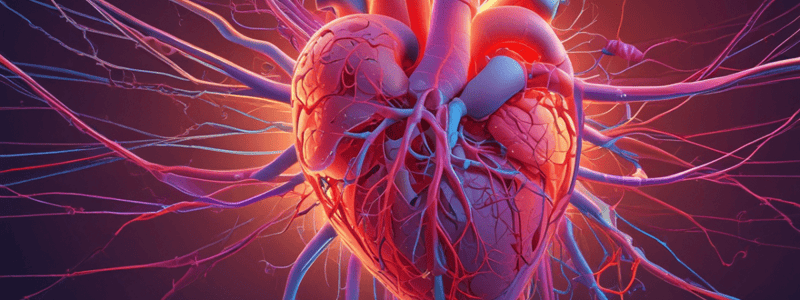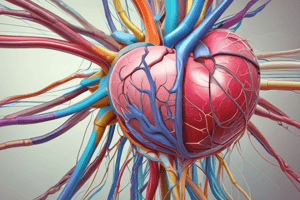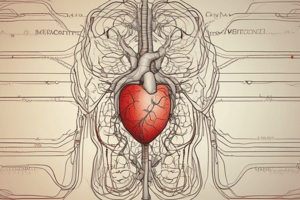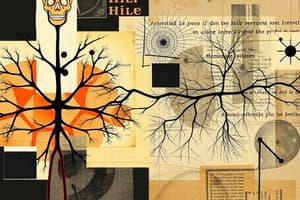Podcast
Questions and Answers
The ______ nervous system innervates the myocardium and the pacemaker cells.
The ______ nervous system innervates the myocardium and the pacemaker cells.
sympathetic
The ______ nervous system only innervates the pacemaker cells.
The ______ nervous system only innervates the pacemaker cells.
parasympathetic
At rest, the heart rate is under more ______ control than sympathetic control.
At rest, the heart rate is under more ______ control than sympathetic control.
parasympathetic
If you were to remove all of the ______ of the heart, you would find that it beats faster than normal.
If you were to remove all of the ______ of the heart, you would find that it beats faster than normal.
The heart's cardiac output depends on both heart rate and ______ volume.
The heart's cardiac output depends on both heart rate and ______ volume.
The body's heart rate is regulated entirely by ______ factors.
The body's heart rate is regulated entirely by ______ factors.
The ______ nervous system speeds the heart up.
The ______ nervous system speeds the heart up.
______ innervation of the heart comes from the cardiac accelerator nerves.
______ innervation of the heart comes from the cardiac accelerator nerves.
The ______ nervous system is responsible for the body's 'flight-or-fight' response.
The ______ nervous system is responsible for the body's 'flight-or-fight' response.
The ______ system can influence the rate and force of heart contractions.
The ______ system can influence the rate and force of heart contractions.
The ______ nerves provide sympathetic innervation to the heart.
The ______ nerves provide sympathetic innervation to the heart.
The ______ response involves speeding up the heart rate.
The ______ response involves speeding up the heart rate.
The ______ nervous system increases heart rate by depolarizing the pacemaker cells of the SA node.
The ______ nervous system increases heart rate by depolarizing the pacemaker cells of the SA node.
The hormone ______ increases heart rate when the heart is exposed to it.
The hormone ______ increases heart rate when the heart is exposed to it.
The ______ Law of the Heart states that when the rate of blood flow into the heart changes, the heart adjusts its output accordingly.
The ______ Law of the Heart states that when the rate of blood flow into the heart changes, the heart adjusts its output accordingly.
The ______ volume is the maximum amount of blood that fills the heart during diastole.
The ______ volume is the maximum amount of blood that fills the heart during diastole.
The ______ medulla produces the hormone epinephrine, which increases heart rate.
The ______ medulla produces the hormone epinephrine, which increases heart rate.
The ______ nervous system slows the heart rate by hyperpolarizing the pacemaker cells.
The ______ nervous system slows the heart rate by hyperpolarizing the pacemaker cells.
Study Notes
Nervous System Functions in Heart Regulation
- The autonomic nervous system innervates the myocardium and pacemaker cells of the heart.
- The parasympathetic nervous system exclusively innervates pacemaker cells, influencing heart rate.
- At rest, the heart rate is primarily under parasympathetic control, which is more dominant than sympathetic control.
- If all nerves were removed from the heart, the heart would beat faster than normal due to inherent pacemaker activity.
Cardiac Function and Output
- Cardiac output is determined by both heart rate and stroke volume.
- Heart rate is regulated entirely by neural factors, adapting to bodily demands.
Sympathetic and Parasympathetic Interactions
- The sympathetic nervous system accelerates heart rate through cardiac accelerator nerves.
- The sympathetic nervous system is integral to the body's "fight-or-flight" response, enhancing physical readiness.
- Sympathetic nerves provide essential innervation to the heart, increasing both rate and force of contractions.
Heart Response and Hormonal Influence
- The sympathetic response is characterized by an increase in heart rate.
- The sympathetic nervous system raises heart rate by depolarizing pacemaker cells in the sinoatrial (SA) node.
- Epinephrine, a hormone released by the adrenal medulla, further increases heart rate when the heart interacts with it.
Cardiac Output Adjustments
- The Frank-Starling Law of the Heart explains that changes in blood flow into the heart result in corresponding adjustments in cardiac output.
- End-diastolic volume refers to the maximum amount of blood that the heart can hold during diastole.
Parasympathetic Influence on Heart Rate
- The parasympathetic nervous system works to slow the heart rate by hyperpolarizing pacemaker cells, counteracting sympathetic stimulation.
Studying That Suits You
Use AI to generate personalized quizzes and flashcards to suit your learning preferences.
Related Documents
Description
Explore how the sympathetic and parasympathetic nervous systems innervate the SA and AV nodes in the heart, affecting heart rate and stroke volume differently. Understand the specific roles of each system in controlling cardiac function.




